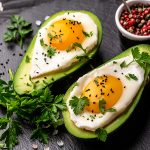In a world where food is available 24/7—from home delivered groceries to Uber Eats and DoorDash—it seems strange that so many of us walk around with a gnawing and persistent hunger.
You eat… yet you still feel hungry. You snack… but your cravings just don’t quit.
Why?
It turns out that hunger isn’t just about how much you eat—it’s more about what you eat. And one of the biggest problems may be that we’re eating a lot of the wrong foods, and not enough of the right ones.
If your body isn’t getting the nutrients it truly needs, it will keep sending hunger signals, no matter how many calories you consume. Let’s look at three common eating mistakes that leave people feeling unsatisfied—and what to do instead.
🥑 Mistake #1: Avoiding Healthy Fats
For years, we were told that fat was the enemy. “Low fat” and “fat-free” labels took over the grocery stores and, to this day, many people still avoid fats because they think it will help slim them down.
But here’s the truth: Eating healthy fats does not cause weight gain.
In fact, your body needs these fats. They have all sorts of health benefits… including the ability to keep you feeling full long after you’ve eaten them. So even though they’re high in calories, they can ultimately cut your caloric intake! Plus, healthy fats are essential for brain health, hormone balance, and energy.
Smart Fats That Keep You Full Include:
- Extra Virgin Olive Oil: Adds flavor to your food—and increases serotonin, a hormone that helps you feel satisfied. It may even help you eat up to 175 fewer calories per day.
- Avocados: Are rich in monounsaturated fats that regulate leptin (the hormone that says “you’re full”) and help balance insulin. This keeps you feeling satiated throughout the day.
- Tree Nuts: Despite the myth that nuts make you fat, just the opposite is true. They may even encourage weight loss. Nuts like almonds, walnuts, pistachios, and Brazil nuts are packed with protein, fiber, and healthy fats that keep you feeling full between meals.
💡 Tip: Skip the peanuts (technically legumes). They contain proteins that are resistant to digestion and are considered toxic. Even worse, peanuts contain aflatoxin, a natural toxin produced by certain strains of mold. Aflatoxin is a carcinogen that’s been shown to cause cancer in rats.
🍳 Mistake #2: Skimping on Protein
Protein is your hunger-control hero. Unlike carbs that burn off quickly, protein keeps you full for hours, balances blood sugar, and curbs cravings.
One of the best times to get a protein boost is at breakfast.
Eating protein first thing in the morning—like pasture-raised eggs—can significantly reduce ghrelin, the hormone that makes you feel hungry. It also helps prevent energy crashes that lead to unhealthy snacking.
Easy Ways to Add More Protein:
- Enjoy more plant-based proteins like beans, peas, lentils, nuts and seeds.
- Try plain, unsweetened Greek yogurt. Top with nuts and seeds to increase the protein content
- Check out recipes for high protein smoothies. Most include a plant-based milk (such as almond milk) and a plant-based protein powder mixed with fruits, berries and greens.
- Wild-caught fish, grass-fed beef, and pasture-raised chicken in moderation. (Aim for no more than 15% of your diet)
💡 Tip: Prioritize plant-based sources to support digestion and gut health.
🧁 Mistake #3: Using Artificial Sweeteners
If you’re using “sugar-free” or “zero-calorie” sweeteners, you might think you’re doing your waistline a favor. But these fake sugars can actually increase hunger and lead to weight gain.
Here’s What Happens When You Eat Fake Sugar:
- Your brain expects sugar. Your body releases insulin in preparation.
- But there are no real calories, so your brain feels tricked.
- Your brain says “Hey, wait a minute. You can’t fool me. This isn’t right. It’s fake. I want a REAL SWEETENER!”
- The result? Your body is craving even more sweets and your appetite is revved up higher than it was before. So you have more cravings, more hunger—and more snacking.
Plus, artificial sweeteners disrupt your gut microbiome, encouraging bacteria that store fat and spike blood sugar.
💡 Tip: If you want a no-calorie sweetener, opt for stevia. It’s plant-based, safe, and doesn’t trigger the same metabolic confusion.
🥗Final Thoughts: How to Stay Full All Day
Feeling hungry all day isn’t just annoying—it’s exhausting. But you don’t have to live that way.
Start by:
- Adding healthy fats to your meals
- Prioritizing protein, especially in the morning
- Ditching fake sweeteners that mess with your metabolism
Once you start eating the right foods, you’ll notice the difference: fewer cravings, better energy, and a lot more satisfaction from every meal.
SOURCES:
Technische Universitaet Muenchen. “Olive oil makes you feel full.” ScienceDaily. Mar 2013.
Wien M, Haddad E, Oda K, Sabaté J. A randomized 3×3 crossover study to evaluate the effect of Hass avocado intake on post-ingestive satiety, glucose and insulin levels, and subsequent energy intake in overweight adults. Nutr J. 2013 Nov 27;12:155.
Jackson CL, Hu FB. Long-term associations of nut consumption with body weight and obesity. Am J Clin Nutr. 2014 Jul;100 Suppl 1:408S-11S
Paddon-Jones D, Westman E, Mattes RD, Wolfe RR, Astrup A, Westerterp-Plantenga M. Protein, weight management, and satiety. Am J Clin Nutr. 2008 May;87(5):1558S-1561S.
Ratliff J, Leite JO, de Ogburn R, Puglisi MJ, VanHeest J, Fernandez ML. Consuming eggs for breakfast influences plasma glucose and ghrelin, while reducing energy intake during the next 24 hours in adult men. Nutr Res. 2010 Feb;30(2):96-103.
Taheri S, Lin L, Austin D, Young T, Mignot E. Short sleep duration is associated with reduced leptin, elevated ghrelin, and increased body mass index. PLoS Med. 2004 Dec;1(3):e62. Epub 2004 Dec 7.
Spiegel K, Tasali E, Penev P, Van Cauter E. Brief communication: Sleep curtailment in healthy young men is associated with decreased leptin levels, elevated ghrelin levels, and increased hunger and appetite. Ann Intern Med. 2004 Dec 7;141(11):846-50.
Papatriantafyllou E, Efthymiou D, Zoumbaneas E, Popescu CA, Vassilopoulou E. Sleep Deprivation: Effects on Weight Loss and Weight Loss Maintenance. Nutrients. 2022 Apr 8;14(8):1549.
Yang Q. Gain weight by “going diet?” Artificial sweeteners and the neurobiology of sugar cravings: Neuroscience 2010. Yale J Biol Med. 2010 Jun;83(2):101-8.
Suez J, Korem T, Zeevi D, Zilberman-Schapira G, Thaiss CA, Maza O, Israeli D, Zmora N, Gilad S, Weinberger A, Kuperman Y, Harmelin A, Kolodkin-Gal I, Shapiro H, Halpern Z, Segal E, Elinav E. Artificial sweeteners induce glucose intolerance by altering the gut microbiota. Nature. 2014 Oct 9;514(7521):181-6.



